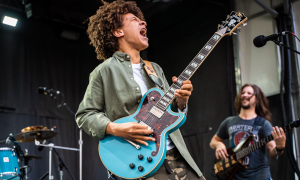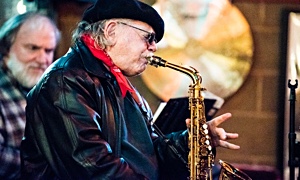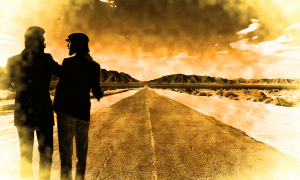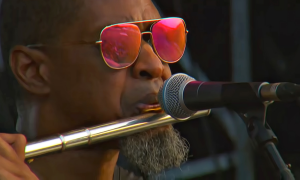Home » Jazz Articles » Talking 2 Musicians » Oteil Burbridge: Long Live the Dead
Oteil Burbridge: Long Live the Dead
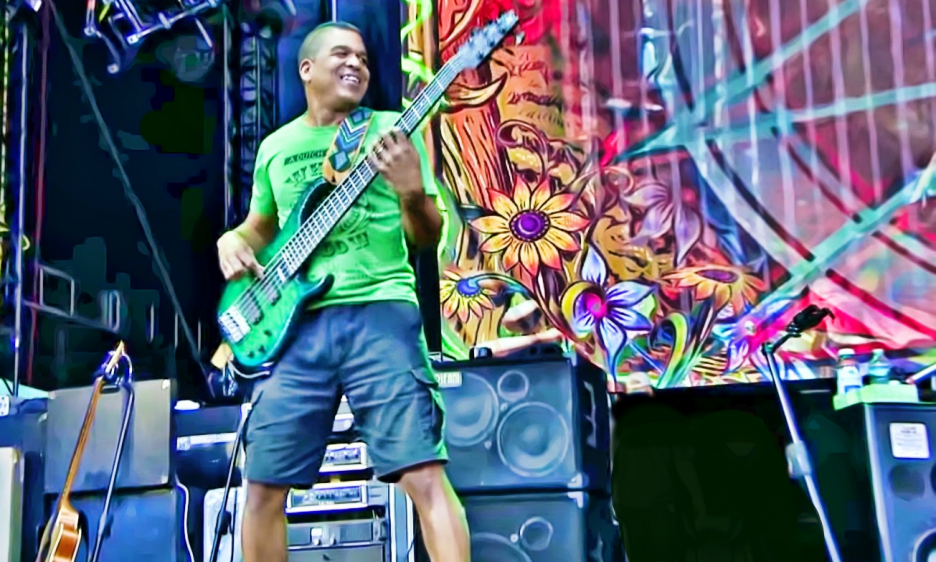
It seems when people overcome that darkness and don't let it kill their spirit, there seems to be some really fine wine that comes out of that.
Oteil Burbridge is best known for his 17 year stint with the Allman Brothers Band, for which he received a Grammy Lifetime Achievement Award. He was also an original member of the cult band Aquarium Rescue Unit, and in the original lineup of the Tedeschi Trucks Band. He's one of my favorite musicians, someone whose empathy, enthusiasm and energy are focused like a laser beam on serving the music and supporting the soloist with whom he is playing.
The night before we spoke B.B. King passed away, so initially our conversation turned to him and the blues, I asked if he had met and or played with him.
"We played some shows together when I was with TTB (Tedeschi Trucks Band) but I actually went with my wife Jess to see him at the Fox, and we just paid, went and bought a ticket and sat in the audience. It was special because that was the first time I got to see him live. He was already much older at that point, but it was like when I saw Bobby Blue Bland—just the opportunity to see them live at all was such a great gift. They are living history. But I did get to meet him at either the Montreux or the North Sea Music festival. My wife and I got to meet him and have our pictures taken with him."
"When you consider the place and time he was born in, to have overcome all of that, I mean if you put aside his career and how many people all over the world who loved him, and whom he made so happy—just the fact he ended up throughout the ages as not bitter, it's so huge. He and Willie Nelson are two people I've met whose humility is as big as their iconic status—that is a freakin' rare thing right there. I think it was his humility that kept him from being bitter."
"He was such a gracious person. He fostered his gift, and how far it took him, all that he did and accomplished. To me it's a day to celebrate the human being and all that he accomplished, and the example that he set of what musicians are capable of doing. And good for him that he played right up until the end, you know, that was his whole life. When I went to see him, he mostly told stories the whole night—I wasn't there in '64, I was just being born. So I was glad just to lay eyes on him, people could lay eyes on a lot of their heroes and it wouldn't matter if they weren't the same as they were in their '20s. I mean who cares, I'm so glad that he went for as long as he could."
Seeing Bobby Blue Bland
"I'll never forget, it was in the late 80s or early 90s, and I was working for Col. Bruce (Hampton) and if I recall correctly, and my memory's not always the best, Col. Bruce canceled a gig and said, (laughing) 'If I don't see you at the Bobby Blue Bland concert your fired!' I said, man we're so poor we need the money, but he was like, 'Bobby Blue Band is coming, and you gotta go see him, that's it!'""But he got us on the list and all that. So I got to see him, and I think Wayne Bennett was still alive. It was so great, not just Bobby, but the interaction between him and the audience—especially the women. They would come up and bring dollar bills up to the edge of the stage. And that album of BB and Bobby together, I think that's the one we're gonna put on today. (Laughing) Although, "Live at the Regal" in '64 is just.. ."
His first B.B. King album
"It was very late in life, I was such a jazz, funk, fusion-head that I didn't really listen to the blues until I met the Col. Although my dad was a big jazz fan, he had some blues in his collection, and he listened to BB King all the time. But it was really Col. Bruce who turned me on to Delta Blues which helped me to understand the later blues and bluegrass and the different American folk music. So it was pretty late for me, buying a BB King record. But by the time I did get one, what I didn't get before, was what blew me away the most. (Laughing)""When you come from a jazz or classical background, it's all about chops, chops, chops. But with BB, he could play the same licks, but they would be different every single time. That's seemingly impossible (laughing) but it's not! It's never the same thing. He never had any blockage between what he is and his guitar. And his voice, you hear every bit of what you love about him, and all the hardship and adversity that he came from."
"We have a theme that just keeps coming up about the adversities of life, and I kind of learned it out of the Bible, but the metaphor or analogy of the wine-press, everybody loves the fine wine, but nobody likes being the grapes, (both laughing) That's what BB and all the greats are, it's just that fine wine that came from them being crushed. Everybody got to drink it and appreciate it."
The power of Son House
"If they had had an easier life, we might not have got that. I don't know, but I have a suspicion that for some crazy reason that was all part of the plan. Because you don't get the wine without the grapes getting' stepped on. Some people just embrace it, you don't necessarily have to be born into a hard situation as far as prejudice or race, or anything like that, but you might be born into an abusive family. Who knows what the situation is. But it seems when people overcome that darkness and don't let it kill their spirit, there seems to be some really fine wine that comes out of that."Musical parents
"My dad did, but he didn't think he was good enough to risk making a career of it. He wanted a family more than anything and that's what he chose, thankfully for me, because I'm really glad that he was home. I just had my first child at 50, and I'm so glad I'm not on the road all the time that I get to spend this time with him. It makes me think of my dad so much, but he did play flute—which is probably how Kofi (Oteil's slightly older brother) played flute, (laughing) when he really wanted to be a keyboard player, although he loves the flute too."Kofi's flute solos
"Oh my God, it's his first instrument, and I'm still trying to catch up to him. He knows so much musically. What a great gift that was to my dad, because they discovered at seven that Kofi had perfect pitch (laughing) so my dad was really psyched! That was a great confluence of events there, as far as my dad loving music so much, and then at seven finding out his son had perfect pitch. So he turned him on to all the greatest stuff, he had a huge library of music at the house. I obviously benefited from that too, from Kofi and my dad. I started playing the drums when I was five, I started playing earlier than that (laughing) but they got me drums so I would stop beating on everything else. I picked up bass guitar around 14, we all played piano at some point when we were young, and had piano lessons, and violin for me and my younger sisters. But Kofi had already taken off on the flute, so I don't think he ever had to do violin."Acoustic bass
"It was always electric bass because I was into funk—well, I was into jazz on drums, and had studied it on drums. My brother Kofi actually bought the first bass guitar, and when he went away to school I picked it up. It was like Earth, Wind & Fire, Parliament Funkadelic , and Stevie Wonder was what I wanted to play. That kind of stuff was just ubiquitous when we were growing up. Like so much jazz too, so I might not know who was the drummer or keyboard player was on this or that session, but all that stuff is so deeply ingrained in my head—because we heard it everyday.""My dad wanted me to get into jazz, and I think my brother kind of used fusion as a bridge to jazz. So it started with funk and Stevie Wonder and Earth, Wind & Fire were a bridge that took me to fusion, which then took me to jazz. But I never wanted to carry around an upright, and that wasn't my first love. My first love was Bootsy Collins and Verdine White, and Larry Graham—it was electric bass. To this day I still don't play upright bass."
"I own a broken one that a friend gave me (cracking up) and I still haven't had it fixed. But I've played other peoples, and it actually hurt my arms because its a different set of muscles, like in my right arm and forearm. If I went long enough, I'm sure it would go all the way down my back. And the left hand spacing is so different and alien to me, and I've always played fretted instruments. I never pursued fretless because there were so many Jaco (Pastorius) clones that I just went in a complete other direction."
Jaco with Joni Mitchell
"You know it's interesting you mention Joni Mitchell, because Joni Mitchell was the first folk music that I heard that I absolutely fell in love with. It was that album Blue and it's pretty much just her, I don't think there a band on the whole record. I absolutely fell in love with that record, and at the same time, I was about 17 years old, so I was already way into Jaco.""And then I found out Joni and Jaco recorded together and it was like a tornado hit me, I'm like, are you kidding! In terms of emotion two of my favorite artists got together, and then I found out Wayne (Shorter) was on some of that, and I was like, oh my God. It just blew my mind. So it was such a great thing to me, here was someone with a totally different style of music, and she loves Pat Metheny, Michael Brecker, Jaco, Wayne, and Herbie. But getting back to your initial question, the first time I heard Jaco was when my brother Kofi turned me on to him. It was really over my head, he played me Jaco's first solo record."
"Donna Lee"
"Yeah, without a piano playing along I couldn't contextualize chord changes, but I'd heard the original and I knew it was right, but it was too early, I was like 14. But I was knocked out by Continuum it hit me very hard. But when I saw Jaco when I was 17 at Constitution Hall, that's when I decided I was going to become a musician.""I'd been in love with Wayne (Shorter) for so long, and I'd been in love with Weather Report before Jaco joined the band. Wayne and Joe (Zawinul)—they were it, like Mount Rushmore guys you know. Those two plus Herbie Hancock, Jan Hammer, George Duke—they are my Mount Rushmore. Those bands, and the bassist Alphonso Johnson, and the drummers—everybody."
"So when I saw Jaco with Weather Report that night, when I was coming home, I thought, whatever the risk, and everybody said being a bassist is crazy, but I thought, these guys are doing it, and if I could get to a quarter of what they were doing it would be worth the risk. (Laughing) I guess that was me embracing the wine press at that moment."
"We always had known that Kofi was going to be a musician because he left Washington DC and went to the Carolina School of the Arts at the age of 14. My parents didn't let me go to music school I think—well I guess if I had really tried they might have let me, but they thought it was risky for two kids."
Sidwell Friends School
"Yeah I did, and it was that. And it's weird because we had this kind of dual upbringing, we lived in Anacostia, South East Washington, and anybody who knows the area, knows that's the legendary hood. So living there, and then going to Potomac School and Sidwell Friends with all these rich kids, whose parents were running the world, either in the corporate or government world (laughing) or the clandestine CIA—so it was an interesting and kind of fascinating upbringing. They did have a program, but there weren't any opportunities for us to play jazz, funk, or fusion, or anything else. I wasn't into school, I just wanted to get out and start playing. Music was all I cared about.""Being There" with Peter Seller in 1979
"I watch it every once and awhile when it comes on, but it's actually been a pretty long time. That came about because Kofi used to do commercials and stuff and he went to Russia with this play called "Inherit the Wind" and they called him for an audition. Of course he wasn't there, so they asked, doesn't he have a little brother?""So then I joined central casting, and that was the big agency in DC for TV, movies, commercials, and local television. Usually it was for work as an extra, but you could get speaking parts too. That movie was made in Washington DC and Asheville, North Carolina. So I went in and auditioned."
"It was really fascinating, Peter Sellers came into our trailer and he told me and Ricky Keller that he had had four heart attacks, and said he'd died during one of them and that it was really beautiful. He then said he was going to die after the movie was made. We were like, 'Oh man, don't say that, that's terrible!' And he said, 'Don't feel bad for me, because I'm actually looking forward to it.' And he died right after that."
"He called it man. I had no idea how heavy it was until much later. And the funny thing is, it's another crazy irony, much later when I met Col. Bruce his whole philosophy is really wrapped up in a nutshell by that movie."
"I didn't really understand Joe Zambi, Joe Zambi is an actual person, and in jest Bruce made him into a Deity, and that's his religion—Zambiism. And he was explaining it to me in a very roundabout metaphorical Merlin way, and I was just totally confused. And as I finally started to get it, I said, 'You know, I think I made a movie of what you're talking about.' And he's like, 'You were in a movie?' And I said, 'Yeah, it's called "Being There."' His eyes got so wide, he's like, 'God Oteil, that's totally it!' And he had gone to see that movie with Joe Zambi and the bassist Ricky Keller, and I said, 'You know Bruce what's really crazy Bruce, the actor who played the gang leader in the movie—his name was Ricky Keller!' We still laugh about how crazy that is. So if people want to really understand Bruce's philosophy, they should watch "Being There." (Laughing) And find somebody named Ricky Keller to go see it with!"
Deodato's jazz version of "Thus Spoke Zarathustra"
[ See video below for scene with Peter Sellers, Oteil and a group of teenagers ]"You know I forgot about that! My dad's got a bunch of Deodato albums. I gotta check that out. Oh my God that's crazy. Man there's no coincidences."
I asked him what his life might have been like if his path had never crossed Brue Hampton's, he might be in New York with an entirely different life.
"I can (laughing) because I see people doing it! Like, that was gonna be me you know. And in another sense that was never gonna be me, because I'm a round peg that can't fit into a square hole. So I do think that at some point I would have taken a complete left, I mean if I hadn't met Col. Bruce, I would have met Sun Ra at some point and ended up in his band. (Laughing) Like something was gonna happen totally left, you know."
Bruce Hampton and the Aquarium Rescue Unit
"It was really thanks to Jeff Sipe, I was just frustrated, and I literally thought, maybe I did make a mistake becoming a musician. Playing music, and doing it for a career are two completely different things. I would advise more people to just do it for fun. But on the other hand, if you embrace the wine-press and you're ready to get crushed and take it, then go for it as a career.""So I was really frustrated, and Jeff Sipe told me that guys who are frustrated go play with this guy Col Bruce, so you should come and meet him. And all the top cats in Atlanta, the best musicians, the top studio musicians, the top touring guys, they all played with the Col. I was like, alright, but I was warned that he was really crazy. I even had someone take me out to lunch, and I was really poor, so a free lunch I said sure. He was musician who had hired me for something, and the whole purpose of the lunch was that he wanted to talk me out of working with Col. Bruce. He was like, 'Oh dude, it's gonna kill your career if you do that.'"
"By that point I was already too far out, too far gone, to go back. But when I met the Col. it was just what I needed. I can't even say it was just what I needed, because what I thought I needed was something totally different from what Col. Bruce was. It was a great gift, and I could never have see that one coming in a million—in ten million lifetimes I couldn't have seen that one coming."
"It was like Saturday Night Live if SNL were a band. We weren't just coming to play music. Music was just skeleton for all the muscle, skin and everything else that was Col. Bruce. Music was something, I don't know how else to put it, it was just something we were hanging our coats on. But the coat was Col. Bruce and his vision of life and music, which I totally understood just on an emotional level. And then I began to understand on an intellectual level. It's difficult to get it on an intellectual level, it's better to come to it on an emotional level. Actually it's emotional, intellectual, and spiritual. If you try to come at it from just your left brain, it's going to seem like nonsense—like most religions do. If you come at it emotionally, then your spirit grabs a hold of it, and then somehow your intellectual somehow understands it."
"It's really about life. People think he's crazy, and they think I'm crazy, but it's actually the world that's crazy. This is our response to how absolutely friggin' crazy this planet is, or some of the people in it. We just wake up here in the situation we find ourselves in, and this insanity that's just super dark. But there are these amazing lights that are given to you along the way as you're getting crushed, like BB King and Col. Bruce Hampton. Thank God Col. Bruce was a light to Duane Allman, and Duane got him his first record deal. If that hadn't happened, I don't know, how many of us would even have ever known about the Col.? He's been a light to a lot of people over the years."
"Bruce is like a charismatic shamanic figure, and if you fall under his spell you'll learn a lot, and you'll get so much from it. And you'll laugh so much. The things I think about when I think of the Col. it's not about music, it's about laughter and how much good food we enjoyed together. You know, just sitting in a restaurant with the Col. and people are walking by the plate glass outside the front of the restaurant. And he would point out how funny it was, like look at this guy, it was like watching a movie. He taught me to look at life like I was watching a movie. And he taught me to listen to music that way, and that's how I began to start becoming aware of how great people like BB King were. You hear their life story, and it's like, oh my God! And then that ruins so much other music. You realize they aren't telling their story, it's a total lie."
"I never would have fallen in love with Allison Krauss if I hadn't met Col. Bruce. I literally think I was destined to meet him, because there is so much other music that I just wouldn't have paid attention to if it weren't for him."
At this point we had a technical glitch before I could get to the Allman Brothers or Dead & Co., but as Oteil said, there are no coincidences and this is a great place to stop.
Photo credit: YouTube screen capture
< Previous
Bob Reynolds: Communication Is Key
Next >
Time in Jazz 2018
Comments
Tags
Talking 2 Musicians
Oteil Burbridge
Alan Bryson
Bob Weir
Grateful Dead
John Mayer
Bobby Blue Bland
Willie Nelson
Earth, Wind & Fire
Parliament Funkadelic
Stevie Wonder
Bootsy Collins
Verdine White
Larry Graham
Weather Report
Herbie Hancock
Jan Hammer
George Duke
Alfonso Johnson
Duane Allman
For the Love of Jazz
 All About Jazz has been a pillar of jazz since 1995, championing it as an art form and, more importantly, supporting the musicians who create it. Our enduring commitment has made "AAJ" one of the most culturally important websites of its kind, read by hundreds of thousands of fans, musicians and industry figures every month.
All About Jazz has been a pillar of jazz since 1995, championing it as an art form and, more importantly, supporting the musicians who create it. Our enduring commitment has made "AAJ" one of the most culturally important websites of its kind, read by hundreds of thousands of fans, musicians and industry figures every month.






